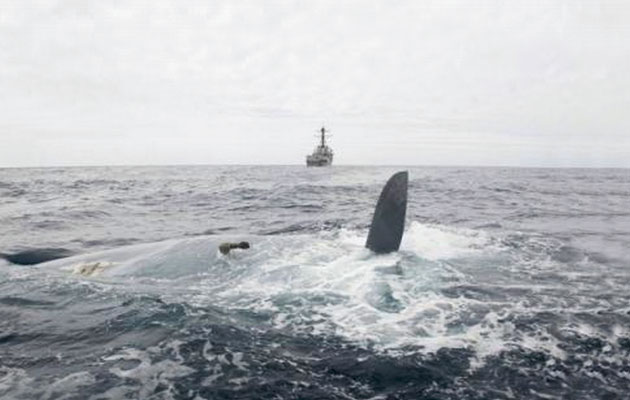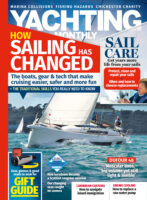Sailors are being asked to comment on six draft marine guidance notices (MGNs) on yacht safety. It follows a pledge by the Maritime and Coastguard Agency to review MGN 280 following the Cheeki Rafiki trial
A four-week consultation on six draft marine guidance notices (MGNs) about yacht safety is now underway.
It follows a review of MGN 280 by the Maritime and Coastguard Agency (MCA) after the jury in the Cheeki Rafiki trial recommended the notice, which applies to small commercial vessels like charter yachts, be tightened.
Douglas Innes, whose company Stormforce Coaching managed the Beneteau 40.7, was found not guilty of manslaughter following a re-trial.
Andrew Bridge, 22, James Male, 22, Steve Warren 52, and Paul Goslin, 56, died when Cheeki Rafiki lost her keel in the mid-Atlantic in May 2014.
Innes was initially prosecuted in 2017, but the jury failed to reach a verdict on the manslaughter charges. It did find Innes guilty of failing to ensure the Cheeki Rafiki was operated in a safe manner.
In delivering its not guilty verdict at the retrial, the jury said it was ‘deeply concerned’ about MGN 280, and recommended it be reviewed and tightened.

The four crew of the Cheeki Rafiki were lost in the North Atlantic
Judge Mr Justice Tearne, said that the technical requirements in MGN 280 for equipment and machinery in a vessel did have legal standing, although other aspects of a general nature did not and should be considered best practice.
Throughout the trial there had been conflicting evidence about whether coding authorities should be notified in the event of grounding. The court heard that Cheeki Rafiki had grounded twice in 2013 while owned by Stormforce Coaching. Neither incident was reported.
The six draft MGNs cover guidance on keel groundings, rigging inspections, preparedness, stowage of lifesaving gear, vessel resilience and emergency procedures, and maintenance, modifications, damage and repairs. They are aimed at both small commercial vessels as well as pleasure boats.
Keel Groundings: Provides guidance to yacht owners and those in the marine industry about how to check for an inner hull matrix failure following a grounding or similar incident.
Rigging Inspections: Stresses a rig inspection should be carried out by qualified professional. Give guidance on when a rigging inspection should be considered and areas of failure.
Preparedness: Guidance on what to consider before undertaking a ‘significant voyage’ and to identify the limitations in the vessel and crew.
Stowage of Lifesaving Gear: Guidance on where to stow certain pieces of life saving equipment
Vessel Resilience and Emergency Procedures: Guidance on what to do in different emergency procedures, covering loss of rudder, MOB, water ingress and abandoning ship.
Maintenance, Modifications, Damage and Repairs: Guidance to yacht owners with regards to effective maintenance regimes to maintain safe operation. It also covers modifications, ensuring the modification doesn’t negatively affect the boat.
Full details on the six draft MGNS and how to give your views can be found here: https://www.gov.uk/government/consultations/consultation-on-yacht-and-powerboat-safety-at-sea
The MCA is also in the process of tightening the Sport and Pleasure Code and amending it via Merchant Shipping Notices (MSNs).

The wreck of the Cheeki Rafiki
The MCA has broken the Sport and Pleasure Code into eight chapters, and is preparing to consult on three of the eight updated sections.
These include:
Chapter 1: The Legal Bit:
This focusses on updated definitions and the application of these definitions. This includes a definition of coded and non-coded vessels, which linked to Chapter 6, ensures that a coded vessel always complies with the requirement to report damage regardless of status. It also defines what an examination looks like, referencing back into compliance and renewal examinations, and separates the definition of owner and managing agent so roles are clearly defined.
Chapter 6: Examinations and Certifications:
This includes a requirement for a Certifying Authority to notify the MCA if it fails to certify, rejects a vessels or refuses to issue a certificate. This applies to inspections worldwide.
Clarification on accident reporting so any incident involving the keel, rudder, propulsion unit, hull below the water line or anything that affects the safety of the vessels must be reported to the Certifying Authority.
A requirement for a second examiner to visit a vessel within a period of time in the vessel’s cycle.
Introduction of high risk and low risk vessels with differing inspection regimes.
Chapter 8: Alternative Arrangements:
This covers alternative methods of certification for specific types of activities including the introduction of an examination for non-coded vessels operating commercially for racing.
These three updated chapters will apply to existing and new vessels.
The MCA is also carrying out an internal review on how it works and communicates with its stakeholders and is supporting standardised training for coding examiners.
The families of the Cheeki Rafiki victims have been updated on the changes and consultation.




